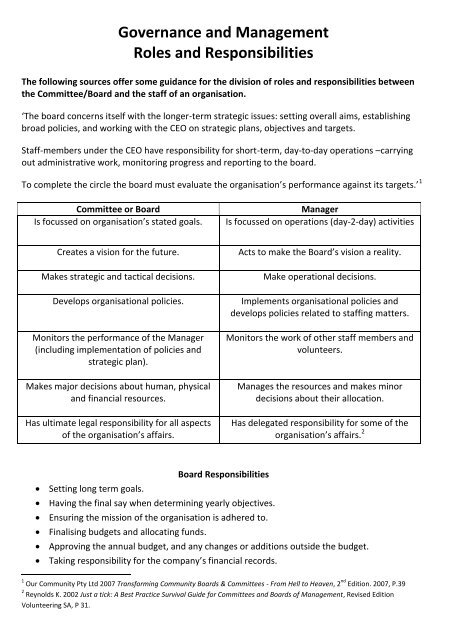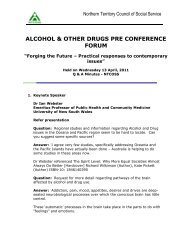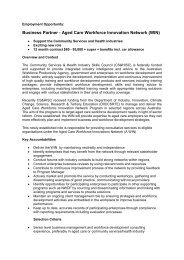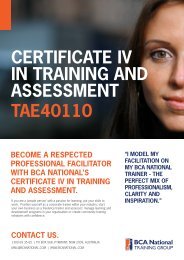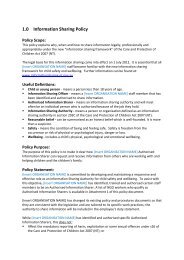Governance and Management Roles and Responsibilities
Governance and Management Roles and Responsibilities
Governance and Management Roles and Responsibilities
You also want an ePaper? Increase the reach of your titles
YUMPU automatically turns print PDFs into web optimized ePapers that Google loves.
<strong>Governance</strong> <strong>and</strong> <strong>Management</strong><br />
<strong>Roles</strong> <strong>and</strong> <strong>Responsibilities</strong><br />
The following sources offer some guidance for the division of roles <strong>and</strong> responsibilities between<br />
the Committee/Board <strong>and</strong> the staff of an organisation.<br />
‘The board concerns itself with the longer-term strategic issues: setting overall aims, establishing<br />
broad policies, <strong>and</strong> working with the CEO on strategic plans, objectives <strong>and</strong> targets.<br />
Staff-members under the CEO have responsibility for short-term, day-to-day operations –carrying<br />
out administrative work, monitoring progress <strong>and</strong> reporting to the board.<br />
To complete the circle the board must evaluate the organisation’s performance against its targets.’ 1<br />
Committee or Board<br />
Is focussed on organisation’s stated goals.<br />
Manager<br />
Is focussed on operations (day-2-day) activities<br />
Creates a vision for the future.<br />
Makes strategic <strong>and</strong> tactical decisions.<br />
Develops organisational policies.<br />
Monitors the performance of the Manager<br />
(including implementation of policies <strong>and</strong><br />
strategic plan).<br />
Makes major decisions about human, physical<br />
<strong>and</strong> financial resources.<br />
Has ultimate legal responsibility for all aspects<br />
of the organisation’s affairs.<br />
Acts to make the Board’s vision a reality.<br />
Make operational decisions.<br />
Implements organisational policies <strong>and</strong><br />
develops policies related to staffing matters.<br />
Monitors the work of other staff members <strong>and</strong><br />
volunteers.<br />
Manages the resources <strong>and</strong> makes minor<br />
decisions about their allocation.<br />
Has delegated responsibility for some of the<br />
organisation’s affairs. 2<br />
Board <strong>Responsibilities</strong><br />
Setting long term goals.<br />
Having the final say when determining yearly objectives.<br />
Ensuring the mission of the organisation is adhered to.<br />
Finalising budgets <strong>and</strong> allocating funds.<br />
Approving the annual budget, <strong>and</strong> any changes or additions outside the budget.<br />
Taking responsibility for the company’s financial records.<br />
1 Our Community Pty Ltd 2007 Transforming Community Boards & Committees - From Hell to Heaven, 2 nd Edition. 2007, P.39<br />
2 Reynolds K. 2002 Just a tick: A Best Practice Survival Guide for Committees <strong>and</strong> Boards of <strong>Management</strong>, Revised Edition<br />
Volunteering SA, P 31.
Evaluating programs, services <strong>and</strong> products.<br />
Evaluating Board <strong>and</strong> its performance.<br />
Employing the organisation’s manager (executive officer / director/ etc.) setting their<br />
compensation package <strong>and</strong> evaluating their performance in the job.<br />
Appointing new Board members when there are unplanned vacancies.<br />
Selecting sub-committee members <strong>and</strong> managing committees.<br />
Taking responsibility for all legal matters.<br />
Taking responsibility for compliance with regulatory requirements (eg. annual general<br />
meeting, annual returns, audit, insurances <strong>and</strong> licences etc).<br />
Appointing auditors <strong>and</strong> approving the audit of the financial records.<br />
Maintaining <strong>and</strong> building the organisation’s public profile.<br />
Staff <strong>Responsibilities</strong><br />
Staff members have contact with the Board through management channels. In most cases, formal<br />
responsibility for staff functions will rest with the Manager– the Staff are responsible to the<br />
Manager, who is in turn responsible to the Board. The following are generally staff members’<br />
responsibilities (in relation to <strong>Governance</strong>):<br />
Providing information to the Boards.<br />
Supporting the Board’s planning function.<br />
Determining community needs.<br />
Operating programs <strong>and</strong> reporting on their successes <strong>and</strong> shortcomings.<br />
Evaluating staff performance.<br />
Organising events, fundraising activities etc. once approved by the Board.<br />
Employing <strong>and</strong> dismissing staff members <strong>and</strong> volunteers.<br />
Managing staff problems.<br />
Implementing Board decisions.<br />
Conducting day-today financial operations.<br />
Monitoring <strong>and</strong> managing daily operations.<br />
Joint responsibilities<br />
The following activities are best conducted jointly:<br />
Discussing ideas <strong>and</strong> forming long-term goals.<br />
Planning organisation strategies.<br />
Designing programs to achieve the group’s mission.<br />
Proposing fundraising ideas.<br />
Ensuring risk management programs are implemented.<br />
Ensuring that achievements are recognized <strong>and</strong> documented.<br />
Promoting the organisation 3 .<br />
3 Our Community Pty. Ltd. 2009, Surviving <strong>and</strong> Thriving as a Safe, Effective Board Member, Pp60,61


